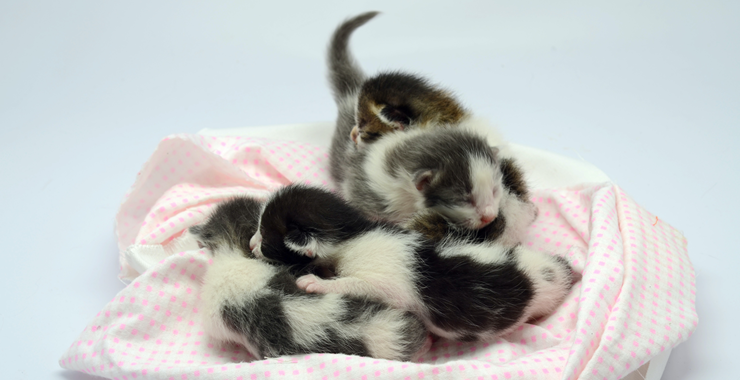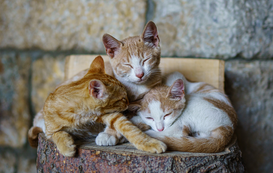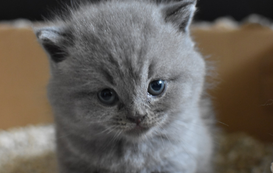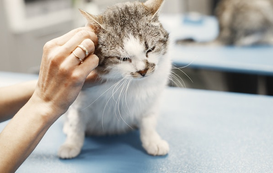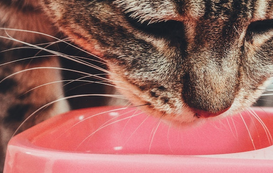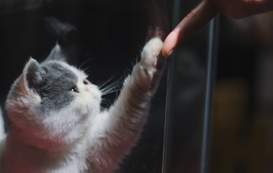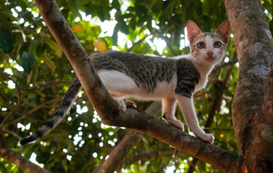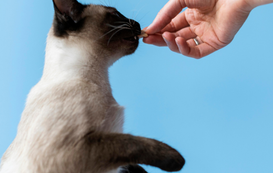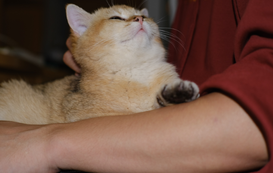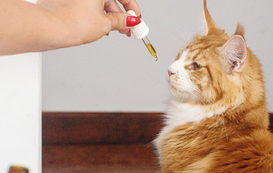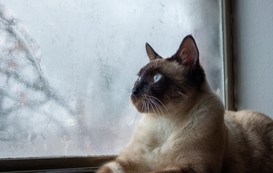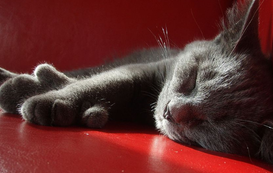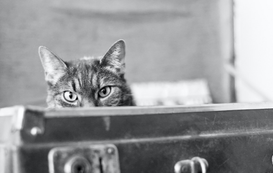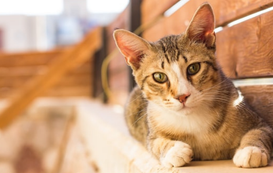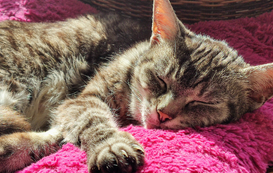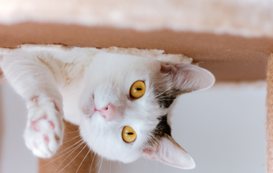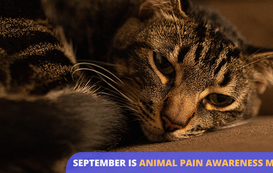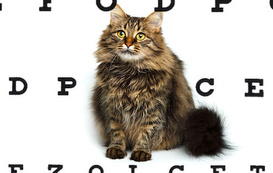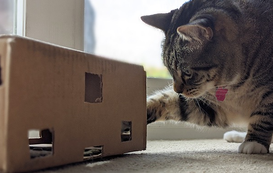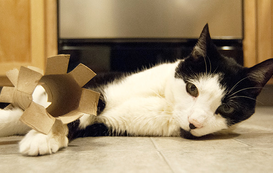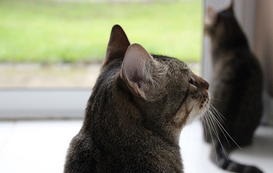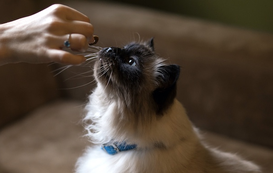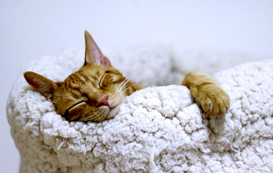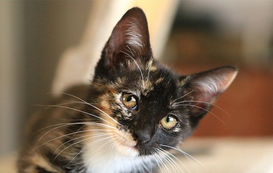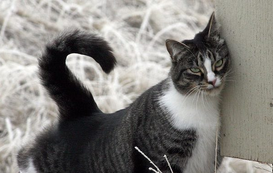At Meowtel, we recommend getting your cats spayed and neutered for a variety of reasons; but we also understand that life happens! Whether you've recently rescued a pregnant cat or are fostering to provide a temporary safe space for a soon-to-be mama cat, welcoming a pregnant cat into your home is an exciting and rewarding experience. However, it also comes with responsibilities to help support the health and well-being of both the mother and her soon-to-arrive litter of kittens. Proper care during pregnancy and after birth helps foster a safe and comfortable environment for your feline family. In this comprehensive guide, we will walk you through the essential steps and considerations for caring for a pregnant cat and her newborn kittens.
Pregnancy Care
Caring for a pregnant cat begins with providing her with proper nutrition, veterinary care, and a comfortable space to give birth. Here are the key aspects to consider:
Nutrition: Pregnant cats require a diet rich in high-quality protein and essential nutrients. Consult with your veterinarian to choose a suitable commercial cat food that meets her increased nutritional needs during pregnancy.
Veterinary Care: Regular veterinary check-ups are essential to monitor the health of the pregnant cat and her kittens. Vaccinations, deworming, and overall health assessments should be part of the care routine.
Nesting Area: Prepare a quiet and secluded area for the pregnant cat to give birth. Line it with soft bedding to help her feel comfortable. Providing a nesting box can give her a sense of security.
Labor and Delivery
When the time comes for the pregnant cat to give birth, there are several things you can do to support her and the upcoming kittens:
Observation: Keep a close eye on the pregnant cat as her due date approaches. Cats usually give birth without assistance, but being present allows you to intervene if complications arise.
Kitten Supplies: Have essential supplies ready, such as clean towels, a heating pad, and a pet-safe heating lamp. These items can help maintain the kittens' warmth during and after birth.
Veterinary Contact: Keep your veterinarian's contact information handy in case of emergencies or if you have questions during the birthing process.
Caring for Newborn Kittens
Once the kittens are born, a new set of responsibilities arises. The early stages of kittenhood are delicate, and proper care is vital for their growth and development:
Bonding Time: Allow the mother cat to bond with her kittens. She will instinctively care for them by nursing, cleaning, and keeping them warm.
Monitoring: Observe the kittens closely to check that they are nursing and gaining weight. Consult your veterinarian if you notice any signs of weakness, illness, or if a kitten is not nursing.
Nutrition: The mother cat's milk provides essential nutrients for the kittens during the first few weeks of life. Avoid supplementing with cow's milk, as it can cause digestive issues. Consult your vet if there are concerns about the kittens' growth.
Sanitation: Keep the nesting area clean and dry. Gently clean the kittens using a damp cloth if the mother cat is unable to groom them adequately.
Socialization: As the kittens grow, gradually introduce gentle handling to accustom them to human interaction. This early socialization helps them become well-adjusted adult cats.
Weaning and Beyond
Around four weeks of age, kittens can start transitioning to solid food. Here's how to manage this phase:
Introducing Solid Food: Begin by offering a high-quality, kitten-specific wet food mixed with kitten milk replacement formula. Gradually decrease the formula as the kittens become more comfortable with solid food.
Litter Training: Around the same time, kittens can start learning to use a litter box. Place a shallow litter box nearby and guide them to it after meals. For more tips, check out our guide on litter box basics.
Vet Visits: Schedule a veterinarian appointment for vaccinations and a health check for the kittens. Discuss spaying and neutering options for when they reach an appropriate age.
In Summary
Caring for a pregnant cat and her newborn kittens is a rewarding journey that requires dedication and knowledge. By providing proper nutrition, a comfortable environment, veterinary care, and early socialization, you can help support the health and well-being of both the mother cat and her adorable litter. Remember that every cat is unique, so closely monitor their progress and don't hesitate to seek professional guidance from your veterinarian. The joy of watching the kittens grow and thrive will undoubtedly be a heartwarming experience for any cat parent.
Traveling and looking for a cat sitter on Meowtel to look after your pregnant cat during this labor-intensive process? Find a cat sitter on Meowtel today. Consider booking longer drop-in visits or overnight stays. You might want to chat with your sitter at a meet and greet to discuss if they are comfortable providing the specific care your cat needs.
Sources:
UC Davis Koret Shelter Medicine Program. "Guidebook: Guide to Raising Unweaned and Underage Kittens." https://www.sheltermedicine.com/library/guidebooks/?r=guide-to-raising-unweaned-underage-kittens/caring-for-kittens-from-birth-to-eight-weeks
The Animal Humane Society. "Caring for Young Kittens and Their Mothers." https://www.animalhumanesociety.org/resource/caring-young-kittens-and-their-moms
PetMD. "Cat Pregnancy and Kittens: The Complete Guide." https://www.petmd.com/cat/conditions/reproductive/cat-pregnancy-and-kittens-complete-guide
The Spruce Pets. "Postnatal Care of a Mother Cat and Her Newborn Kittens." https://www.thesprucepets.com/post-natal-cat-care-555416
Ready to find the purrfect sitter for your feline friend? Find a cat sitter on Meowtel today!

